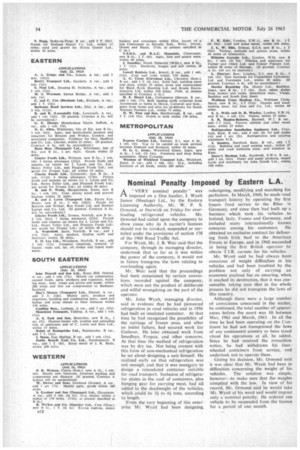Nominal Penalty Imposed by Eastern L.A.
Page 36

If you've noticed an error in this article please click here to report it so we can fix it.
A"VERY nominal penalty" was imposed on a Diss haulier, I. Wyatt Junior (Haulage) Ltd., by the Eastern Licensing Authority, Mr. W. P. S. Ormond. at Norwich on Friday for overloading refrigerated vehicles. Mr. Ormond had called upon the company to show cause why its A carrier's licences should not be revoked, suspended or curtailed under the provisions of section 178 of the 1960 Road Traffic Act.
For Wyatt, Mr. J. B. Weir said that the company, through its managing director, undertook that so far as it was within the power of the company, it would not in future transgress the laws relating to overloading again.
Mr. Weir said that the proceedings had been occasioned by certain convictions recorded against the company, which were not the product of deliberate and wilful wrongdoing on the part of the operator.
Mr. John Wyatt, managing director, said in evidence that he had pioneered refrigeration in road vehicles and in 1956 had built an insulated container. At that time he had recognized the possibility of the carriage of frozen peas, and after an initial failure, had secured work for Unilever. He later obtained work from Smedleys. Fropax, and other concerns. At that time the method of refrigeration was by dry ice. Not being content with this form of non-mechanical refrigeration he set about designing a unit himself. He realized early on that refrigeration was not enough, and that it was neceuary to design a reinsulated container suitable for road transport. Inclusion of refrigerator plates in the roof of containers, plus hanging gear for carrying meat, had all added to the deadweight of the vehicles, which could be 3+ to 4+ tons, according to length.
From the very beginning of this enterprise Mr. Wyatt had been designing, redesigning, modifying and searching for perfection. In March, 1960, he made road transport history by operating the first frozen food service to the Rhur in Germany, and since then had built up a business which took his vehicles to Ireland, Italy, France and Germany, and included many internationally known concerns among his customers. He obtained an exclusive contract for delivering fresh Irish beef to the American Forces in Europe, and in 1960 succeeded in being the first British operator to obtain T.I.R. carnets for his vehicles.
Mr. Wyatt said he had always been conscious of weight difficulties in his vehicles and had been troubled by the problem not only of carrying an economic payload hut on ensuring, when it reached its destination, that it was consumable, taking care that in the whole process he did not transgress the laws of this country.
Although there were a large number of convictions concerned in the matter, he continued, the total number of appearances before the court was 10 between May, 1961 and March, 1963. In all the time he had been operating on the Continent he had not transgressed the laws of any continental country or been taxed about his operations at all, he added. Since he had received the revocation notice, he had withdrawn his four' wheeled containers from service, and undertook not to operate them.
Giving his decision, Mr. Ormond said it was clear that Mr. Wyatt had been in difficulties concerning the weight of his vehicles. The solution was simple, however-to make sure that the weights complied with the law. in view of his record, Mr. Ormond said he would take Mr. Wyatt at his word and would impose only a nominal penalty. He ordered one vehicle to be suspended from the licence for a period of one month.




































































































